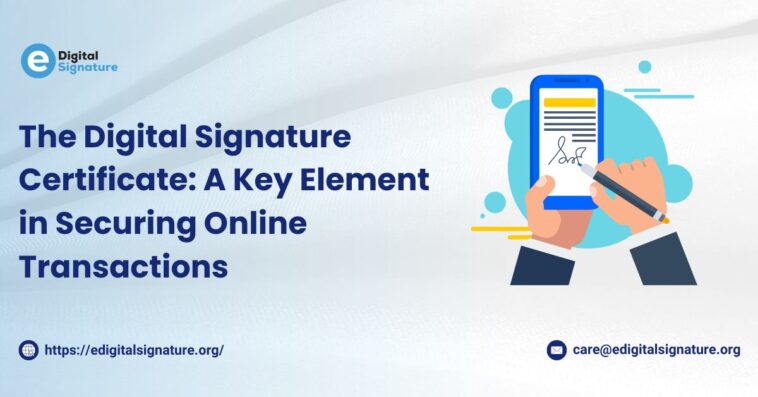In the fast-paced digital world, where virtually every business operation is conducted online, the need for securing sensitive data and transactions has never been greater. Traditional paper-based signatures, which once served as the primary method of authenticating documents and agreements, are no longer sufficient in the online environment. This is where the Digital Signature Certificate (DSC) plays a crucial role.
A Digital Signature Certificate is a cryptographic credential that verifies the identity of an individual or an organization in the digital space. It is widely used to authenticate electronic documents, protect sensitive data, and ensure the integrity of online transactions. The digital signature provides a level of security comparable to traditional handwritten signatures but with additional layers of protection in the online realm.
What is a Digital Signature Certificate (DSC)?
A Digital Signature Certificate (DSC) is an electronic form of a signature that serves as proof of the authenticity and integrity of electronic documents or messages. It uses asymmetric encryption to secure data. The key element in the creation of a DSC is a public key infrastructure (PKI) system, which involves the use of two keys:
-
Private Key: This is a secret key kept by the certificate holder. It is used to create a unique signature for each document or transaction.
-
Public Key: This key is available to anyone who needs to verify the authenticity of the document. It is used by the recipient or verifier to check if the signature matches the private key used to sign the document.
A Digital Signature Certificate is issued by a Certifying Authority (CA), which is an organization that is trusted to verify and authenticate the identity of individuals and entities. The CA validates the identity of the applicant before issuing a DSC.
How Does a Digital Signature Certificate Work?
The process of using a Digital Signature Certificate is relatively straightforward, yet it incorporates advanced cryptographic technology to ensure security. Here’s a step-by-step breakdown of how a DSC works:
Creation of the Signature:
-
The signer uses a software application or a digital signature tool to apply their digital signature to an electronic document.
-
The software generates a hash (a unique representation) of the document. This hash is encrypted using the signer’s private key to generate the digital signature.
Sending the Document:
-
Once the document is signed, it is sent to the recipient. The document contains the encrypted digital signature along with the public key, which is embedded within the signature itself.
Verification of the Signature:
-
The recipient can use the sender’s public key to decrypt the digital signature and retrieve the original hash of the document.
-
The recipient then generates a new hash from the received document and compares it with the decrypted hash.
-
If both hashes match, it means the document has not been altered, and the signature is valid.
Certificate Validation:
-
The recipient can also verify the authenticity of the Digital Signature Certificate itself by checking if it is issued by a trusted Certifying Authority (CA).
-
The CA’s digital certificate, included in the DSC, serves as a trusted source for verifying the identity of the signer.
Types of Digital Signature Certificates
Digital Signature Certificates can vary based on their use case and level of security. They are broadly classified into three types:
-
Class 1 Digital Signature Certificate:
-
Purpose: Primarily used for individual users to authenticate email communications and online accounts.
-
Security: These are typically used for low-risk applications where the risk of fraud is minimal.
-
Use Case: Basic identity verification for personal use.
2 Digital Signature Certificate:
-
Purpose: Used for filing documents with government authorities and for securing online transactions.
-
Security: Provides a higher level of security than Class 1 DSCs, as it verifies the identity of the person or organization in the database of a Certifying Authority.
3 Digital Signature Certificate:
-
Purpose: The highest level of security, suitable for use in high-risk transactions and sensitive documents.
-
Security: Class 3 DSCs require personal presence at the time of application, ensuring a more thorough identity verification process.
-
Use Case: Online bidding in e-commerce, securing contracts, and other high-security applications
Applications of Digital Signature Certificates
Digital Signature Certificates have a wide range of applications in both personal and business contexts. Some of the most common uses include
Use Case: Filing income tax returns, registration with the Ministry of Corporate Affairs (MCA), and applying for government tenders.
-
-
1. E-Government and Tax Filing
One of the most significant uses of DSCs is in government services, where digital signatures are used to file tax returns, register for government services, and submit official documents. For example:
-
Income Tax Returns (ITR): In many countries, individuals and organizations use DSCs to file their tax returns online. The digital signature ensures that the filing is authentic and the data has not been tampered with.
-
MCA Filings: The Ministry of Corporate Affairs (MCA) in India requires companies to submit forms electronically with a DSC, ensuring the authenticity of the filing.
2. E-Commerce and Online Transactions
Digital Signature Certificates are crucial for securing online transactions and e-commerce activities. From payment gateways to online contracts, DSCs provide a way to ensure that both parties are authenticated and the transaction is secure.
Emails containing sensitive or confidential information can be secured using a Digital Signature Certificate. When a digital signature is applied to an email, the recipient can verify the sender’s identity and ensure the integrity of the email’s contents.
-
Email Authentication: Ensures that emails are sent from a legitimate source and have not been tampered with.
4. Digital Payments and Financial Transactions
In the financial sector, DSCs are used to secure digital payments, banking transactions, and even stock market activities. This ensures that the identity of the person initiating the transaction is legitimate and that the transaction cannot be altered.
-
Banking Transactions: Digital signatures help secure online banking transactions and prevent fraud.
-
Stock Trading: Financial institutions use DSCs to verify trades and ensure the security of trading activities.
suggested read:- Digital Signature Certificate for Income Tax
Conclusion
As the world becomes increasingly digital, the importance of secure online transactions and communications cannot be overstated. The Digital Signature Certificate is a crucial tool in ensuring the authenticity, integrity, and confidentiality of electronic documents and transactions. By providing robust security features, DSCs help protect sensitive data from tampering, fraud, and unauthorized access.
-
This post was created with our nice and easy submission form. Create your post!





